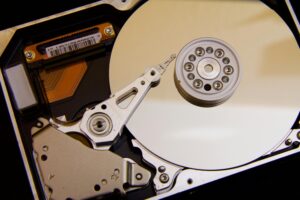In the ever-evolving landscape of technology, one of the most fundamental components remains the storage device. The quest for faster, more efficient, and reliable storage led to the emergence of Solid State Drives (SSDs), challenging the reign of traditional Hard Disk Drives (HDDs). Let’s take a whimsical journey into the heart of these storage giants.

Unveiling the Magic of Hard Disks
The Timeless Classic
Imagine a world where the rhythm of computing was set by the spinning platters of a hard disk. These mechanical marvels, reminiscent of vinyl records, stored data through magnetization. With arms akin to a graceful ballerina, the read/write head pirouetted over these spinning disks to retrieve or store information.
The Dance of Data
Hard disks, sturdy and reliable, became the unsung heroes of digital storage. Their magnetic platters spun tirelessly, holding vast troves of information from family photos to entire operating systems. However, their Achilles’ heel lay in their moving parts, making them susceptible to wear and tear.
The Need for Speed: The Emergence of SSDs
Enter the Solid State Drives, the celestial messiahs of storage solutions. Unlike their mechanical counterparts, SSDs store data on flash-memory chips, reminiscent of a high-speed train zipping through data highways. This absence of moving parts translated into faster access times, lower power consumption, and enhanced durability.
The SSD Revolution
Speed Redefined
In the realm of speed, SSDs emerged as the sprinters of the digital world. Their lightning-fast access times meant quicker boot-ups, seamless multitasking, and swift data transfers, transforming the computing experience into a nimble, responsive ballet.
A Symphony of Silence
Bid farewell to the audible hum of hard disks. SSDs embraced silence, orchestrating a serene computing experience by eliminating the mechanical whirring that once accompanied accessing or saving data. This quietude offered a tranquil oasis in the midst of a digital cacophony.
Endurance and Reliability
Where hard disks exhibited vulnerability to physical shocks or temperature fluctuations, SSDs stood tall as stalwart guardians. Their lack of moving parts rendered them impervious to shocks, ensuring data integrity and reliability even in tumultuous environments.
Choosing the Right Tune for You
Factors to Consider
Choosing between a hard disk and an SSD hinges on various factors. For the ardent data hoarders seeking vast storage capacities at a lower cost, the hard disk sings a tempting melody. However, for those craving speed, efficiency, and durability, the symphony of the SSD might be a harmonious choice.
Balancing Act: Hybrid Drives
In this melodious cacophony of storage options, a hybrid drive emerges as a captivating duet. Combining the best of both worlds, these drives unite the vast storage capacity of HDDs with the speed and responsiveness of SSDs, creating a harmonious balance for many users.
The Overture to the Future
As technology gallops towards the future, the melody of storage continues to evolve. The symphony of storage solutions will likely witness further innovations, perhaps unveiling new paradigms that harmonize speed, capacity, and affordability in perfect synchronization.
Looking Ahead
Future iterations may witness the rise of new technologies like DNA-based storage or quantum storage, promising to redefine the very essence of digital storage. These technological symphonies, yet to grace our ears, hold the promise of rewriting the storied history of data storage once again.
The Final Crescendo
In the grand symphony of technological progress, the tale of hard disks and SSDs serves as a testament to innovation. Each note, whether spun on a magnetic platter or stored in a flash-memory chip, contributes to the ever-evolving symphony of digital storage, enriching our digital lives in ways beyond imagination.
As we bid adieu to this whimsical exploration, let us cherish the tunes played by these storage virtuosos, knowing that the crescendo of technology will continue to echo through time, bringing forth newer, more melodious innovations.
